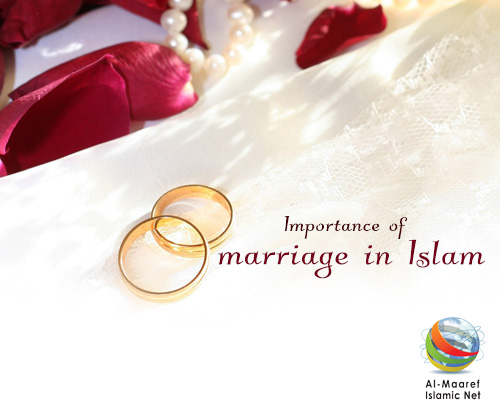The Importance of the Establishment of the Family
It is ascribed to God’s prophet (God’s prayers and peace bestowed upon him and his Household) that he said, “Nothing established in Islam is more liked by The Most High God than marriage is.”1
There are many narratives which spur on marriage and which refer to that small nest where the family lives within a legal and social frame which guarantees the care, security, and completeness for the family. The family is that small society which Islam stresses its importance, spurs on establishing it, and lies the bases for the relationship among its members on the level of the prevailing environments and the behaviors before the level of the rights and duties.
- What are the aims of this establishment?
- What are the environments which prevail in this establishment?
- What are the rights and the duties?
From the Aims of the Family
There are many doctrinal texts which reflect upon the aims of the family building. Here we mention these aims in the following points.
1- Chastity and Purity
Marriage represents the natural satisfaction for the instinct which The Most High God made in the human being and through which reproduction and preservation of the human species are maintained. By means of marriage, this instinct is satisfied and silenced. In addition, the human being guarantees not to slip after this instinct in a fault way. Marriage, therefore, maintains chastity and purity. It is ascribed to God’s prophet (God’s prayers and peace bestowed upon him and his Household) that he said, “Let the man who likes to meet God pure and purified to meet Him with a wife.”2
The address of this call to the human being starts since the age of youth because the human being may weaken in front of the demand and insistence of the instinct if he/she does not satisfy it correctly, properly, and in a religiously permissible way. It is ascribed to God’s prophet (God’s prayers and peace bestowed upon him and his Household) that he said, “Whenever a youth man gets married while being in the stage of youthfulness, his devil uproars, ‘Alas! Alas! He guarded from me two thirds of his religion.’ Then, let the human being be devout as regards the remaining third.”3
2- Fortification of the Morals
Turning away from marriage results in a lot of psychological struggles inside the human being which in turn lead to a lot of psychological complexes and problems which come out in the form of ill nature. From here, marriage puts an end to such disturbances and brings about good nature. It is ascribed to The Noblest Prophet (God’s prayers and peace bestowed upon him and his Household) that he said, “Marry off your male servants, so that God will improve their natures, increase their livings, and add to their vitalities.”4 In addition, it results in the spiritual repose at which The Noble Qur’an points out. The Most High and Glorified God says, ﴾And among His signs is this, that He created for you your wives from among yourselves, that you may find repose in them, and He has put between you affection and mercy. Verily, in that are indeed signs for men of sound knowledge﴿.5
3- Complementarity between the Wife and the Husband and Fulfillment of the Needs of Each One of Them:
Both the man and the woman have gaps in their characters, so each one of them is in need for the other one in order to fill in these gaps. The Noble Qur’an indicates this in the Saying of The Most High God, ﴾…They are libas [i.e. body cover, or screen, or sakan (i.e. you enjoy living with her)] for you and you are libas for them…﴿6
4- Occupation of Time with Obedience
Marriage involves a direct responsibility as regards the providing for the needs of the family after establishing and maintaining it. Therefore, certain daily duties and deeds become requisite, and this in turn presents for the human being daily aims and programs. As a result, this serves in preventing the occurrence of the social evils which originate from vacancy and from the state of having neither an aim nor a responsibility.
Increasing the Believing Progeny and Maintaining the Continuity of Life
It is ascribed to The Noblest Prophet (God’s prayers and peace bestowed upon him and his Household) that he said, “What prevents the believer from getting married? Perhaps God will grant him a child who will fill the earth with, ‘There is no god but God.’”7
The religious texts, therefore, direct the wife and the husband on the basis of these aims and cast on the family specific environments which help in a substantial way in the achievement of these aims. What are the environments which must be available in the family and which ensure the achievement of these divine aims?
The Environments Prevailing in the Family Relationship
The woman must bear in mind that her relationship with her husband has a religious priority and that it comes at the head of everything else as long as this relationship is included within the frame of the religious standards. Such an importance is attached to the woman’s relationship with her husband to the extent that it is considered to be a basis for the woman’s struggle for God’s sake. It is related in the narrative ascribed to The Noblest Prophet (God’s prayers and peace bestowed upon him and his Household) that he said, “Woman’s struggle for God’s sake is fulfilled by her being a good wife.”8 i.e. her good relationship with her husband. There are many details concerning this relationship which the doctrine reflects upon.
1- Affection: The Most High God says, ﴾…and He has put between you affection and mercy…﴿9 Affection is the psychological inclination which represents a basic ground for mutual understanding and harmony.
2- Mercy: It is the other point to which the just mentioned verse points out. Next to affection comes mercy which means tenderness and gentleness. The Most High God did not settle it for the affection and love relationship between the wife and the husband but He added to it the gentleness and tenderness which appear through the behaviors which manifest the act of giving that expects nothing in return.
It is related in the discourse, “Offering her husband [even] a gulp of water will be better for every woman than the worship of a whole year during which she fasts all the days and stays up all the nights [i.e. in praying and supplication].”
3- The Honorable Association: Once the affection and the mercy prevail in the hearts of the husband and the wife, then their imprints will appear in the daily life and in the association between them in the form of ﴾… And live with them honorably…﴿10 For harm can not issue from the one who has affection and mercy towards the other one: ﴾…and do not treat them in such a harmful way that they be obliged to leave…﴿11
This honorable association is manifested in various behaviors which the narratives indicate. It is ascribed to The Noblest Prophet (God’s prayers and peace bestowed upon him and his Household) that he said, “…The best woman among you… is the easy coming, the soft, and the obedient. She is the one who does not sleep while her husband is still angry till he is pleased, and the one who preserves her husband while he is away from her. She is one of God’s workers, and God’s worker is not disappointed.”12
Moreover, it is ascribed to Imam Al-Sadik (God’s peace bestowed upon him) that he said, “One man came to God’s prophet (God’s prayers and peace bestowed upon him and his Household) and said to him, ‘I have a wife who welcomes me when I enter the house. She accompanies me to the door when I leave. And she says to me when she notices that I am worried, ‘What worries you? If you are worried about your living, then it is undertaken by somebody [wanting God] rather than you. And if you are worried about your hereafter, then may God increase your worry.’’ Then, God’s prophet (God’s prayers and peace bestowed upon him and his Household) said to that man, ‘Harbinger her with Heaven, and tell her, ‘You are one of God’s workers, and you are every day granted the reward which seventy martyrs are granted.’’”13
4- Cooperation and Filling In the Gaps: The Most High God says, ﴾…They are libas for you and you are libas for them…﴿14. This verse implies the next connotations. Firstly, each one of them is considered to be an adornment for the other one; for the garment is an adornment for the one putting it on. Secondly, both fortify each other; for the garment fortifies the human being from coldness in winter and keeps back the intensity of the heat of the sun in the summer. Thirdly, both enshroud each other; for the garment enshrouds the body and hides its private parts. If the woman regards a shame or a problem in her husband, her responsibility is to enshroud him at first, to help him fill in this gap at second, and to adorn him in front of the eyes of the people at third.
5- Patience and Tolerance: Impatience and bad temper can destroy the building of the family from its very roots because the wife’s and husband’s association is a daily one and the consequences of impatience will accelerate to an extent at which it can not be controlled and at which it will be hard to be amended. On this basis emerges the recommendation of The Noblest Prophet (God’s prayers and peace bestowed upon him and his Household) with patience: “God grants the woman who is patient with the ill temper of her husband the reward of Asya ibnat Mouzahem.”15
It is also ascribed to Imam Al- Baker (God’s peace bestowed upon him) that he said, “The Most Glorious and Reverent God imposed on the men the struggle for God’s sake and on the women the struggle for God’s sake as well. That of the man is to sacrifice his money and blood until he is killed for God’s sake. On the other hand, that of the woman is to tolerate the hurt and jealousy issuing from her husband.”16
6- Taking into Consideration the Husband’s Capabilities: Let us learn from Sayyda Fatima A-Zahraa The Mistress of the Women of All the Worlds (God’s peace bestowed upon her) when she said to her husband The Prince of the Believers Imam Ali ibn Abi Taleb (God’s peace bestowed upon him), “O Aba Al-Hassan, I am ashamed of my God to ask from you what you are incapable of.”17
Such are the healthy environments to which the sacred doctrine guides us. They are demanded to be a manner and a methodology which govern the behaviors of the wife.
Islam did not put this behavioral methodology only, but also it divided the work of the family, thus assigning for each of the husband and the wife a special role adequate to the nature of each one of them. These assigned roles represent the system which rules the family.
The System of the Family
The Noblest Prophet (God’s prayers and peace bestowed upon him and his Household) divided the work between Imam Ali and Sayyda Fatima (God’s peace bestowed upon both), thus assigning the work inside the house to Sayyda Fatima (God’s peace bestowed upon her) and that outside the house to Imam Ali (God’s peace bestowed upon him). At that, she (God’s peace bestowed upon her) said, “Only God knows how happy I was when God’s prophet spared me to bear the necks of men.”
The Scholar Al-Majlisi says in illustration of this, “Bearing the necks of the men means bearing the things which the necks of the men carry, such as: the canteens and the wood. It may also mean showing up among the men…”18
Anyway, Sayyda Fatima Al-Zahraa (God’s peace bestowed upon her) carried the burdens of the work inside the house to the extent that she (God’s peace bestowed upon her) said, “O God’s prophet! My hands blistered from the hand mill: at one time, I grind; and at another time, I knead.”19
The system in the house of Imam Ali and Sayyda Al-Zahraa (God’s peace bestowed upon both) sets forth this house as a model for the believers in general. There are certain narratives which refer to the woman’s work inside her house; it is ascribed to The Noblest Prophet (God’s prayers and peace bestowed upon him and his Household) that he said, “God looks at the woman who moves something in her husband’s house from one place to another with the aim of using it in a better way. And God does not torture the one whom He looks at.”20
As we have mentioned, the family is a small society which is founded on affection and mercy and which is wrapped by the environments of repose and peace. However, this does not delete the necessity of the presence of a guardian who is considered to be the head of this small society. The man, therefore, is the guardian chosen by The Most High God to govern this small society; The Most High God says, ﴾Men are the protectors and maintainers of women because Allah has made one of them to excel the other…﴿21
This is also assured by the narratives. It is ascribed to The Noblest Prophet (God’s prayers and peace bestowed upon him and his Household) that he said, “The man is benefited by nothing next to Islam but by a Muslim wife who pleases him when he looks at her, obeys him when he orders her, and preserves him in herself and in his money when he is far away from her.”22 In addition, it is ascribed to Imam Al- Baker (God’s peace bestowed upon him) that he said, “The woman has no better intercessor on her behalf to her God than her husband’s pleasure with her is.”23
Such was the model house which was headed by the two Impeccables: Ali and Al-Zahraa (God’s peace bestowed upon both). From her words, it is related that she said to her husband (God’s peace bestowed upon both), “The house is your house, and the free woman [wanting herself] is your wife. Do whatever you wish.”24
The family is that small society which Islam stresses its importance, spurs on establishing it, and lies the bases for the relationship among its members on the level of the prevailing environments and the behaviors before the level of the rights and duties.
From the aims of the building of the family are:
1- Chastity and purity
2- Fortification of the morals
3- Complementarity between the husband and the wife and fulfillment of the needs of each one of them
4- Occupation of the time with obedience
5- Increasing the believing progeny and maintaining the continuity of life
The woman must bear in mind that her relationship with her husband has a religious priority and that it comes at the head of everything else as long as it is included within the frame of the religious standards. It is ascribed to The Noblest Prophet (God’s prayers and peace bestowed upon him and his Household) that he said, “Woman’s struggle for God’s sake is fulfilled by her being a good wife.”
There are many details concerning this relationship upon which the doctrine reflects:
1- Affection
2- Mercy
3- Honorable association
4- Cooperation and filling in gaps
5- Patience and tolerance
6- Taking into consideration the husband’s capabilities
The system in the house of Imam Ali and Sayyda Fatima Al-Zahraa (God’s peace bestowed upon both) sets forth this house as a model for the believers in general.
The family is a small society which is founded on affection and mercy. However, this does not delete the necessity of the presence of a guardian who is considered to be the head of this small society. The man, therefore, is the guardian chosen by The Most High God to govern this small society; The Most High God says,﴾Men are the protectors and maintainers of women because Allah has made one of them to excel the other…﴿
1- To what extent does Islam attach importance to marriage?
2- What is the aim of marriage and family establishment?
3- Is the fulfillment of the needs of the society prior to the fulfillment of the needs of the husband?
4- Mention some issues which the wife must take into consideration in her husband’s house?
5- How did God’s prophet (God’s prayers and peace bestowed upon him and his Household) divide the work between Imam Ali and Sayyda Fatima Al-Zahraa (God’s peace bestowed upon both)?
Sayyda Fatima Al-Zahraa (God’s peace bestowed upon her): The Wife
Sayyda Fatima Al-Zahraa’s (God’s peace bestowed upon her) life in the house of her husband The Prince of the Believers (God’s peace bestowed upon him) is of the most wonderful issues which represent a model which every woman can follow after. Many narratives refer to Al-Zahraa’s (God’s peace bestowed upon her) life in the house of her husband The Prince of the Believers (God’s peace bestowed upon him). Among what the chronicles relate is that one day, God’s prophet (God’s prayers and peace bestowed upon him and his Household) entered his daughter’s house while she was grinding by the hand mill and putting on a cover from the hair of the camels. So he (God’s prayers and peace bestowed upon him and his Household) wept and said, “O Fatima, gulp the bitterness of this life in order to gain the comfort of the hereafter.”
Concerning her good morals, The Prince of the Believers (God’s peace bestowed upon him) said, “…And she never enraged me nor disobeyed any of my orders. My worries and sorrows used to be driven away when I looked at her.”
How content with what God gave her a wife Al-Zahraa (God’s peace bestowed upon her) was. She used to demand nothing from The Prince of the Believers (God’s peace bestowed upon him). The chronicles relate to us that Imam Ali (God’s peace bestowed upon him) woke up one day and asked her, “O Fatima! Do you have anything for me to eat?” She answered, “By Him Who honored my father with prophecy! No, I have nothing to give you to eat. And since two days, I have used to prefer you to my own belly and to my sons as regards any food we have had.” At that, he (God’s peace bestowed upon him) asked, “O Fatima! Why do not you tell me, so that I will try to bring you something?” She (God’s peace bestowed upon her) answered, “I am ashamed of God to ask from you what you are incapable of.”
When Foud’da was serving her, Al-Zahraa did not use to relax and give orders to the maid Foud’da. She (God’s peace bestowed upon her) used to alternate the service between herself and Foud’da: She used to work one day and Foud’da the next day, and so on. The narrative relates that Salman Al-Mohammadi saw Fatima (God’s peace bestowed upon her) while she was sitting down and grinding barley. And he noticed that there was blood on the column of the hand mill. Also, Al-Houssein (God’s peace bestowed upon him) was in a corner of the house starving. So he said to her, “O Daughter of God’s prophet! Your palms have blistered. Here is Foud’da [i.e. let Foud’da do the work].” She (God’s peace bestowed upon her) said back to him, “God’s prophet recommended me to alternate the service between me and her, and yesterday was her service day.”
Such is Sayyda Fatima Al-Zahraa (God’s peace bestowed upon her) in the modest house of her husband. She sublimed herself till The Most High God made her a model for the women of all the worlds and their mistress as well!!
* Woman’s Value and Role. "Lesson seven". Produced and Published by: Al-Maaref Islamic Cultural Association. First Edition: August 2005 A.D. / 1426 of Immigration.
1- Man La Yah’dourohou Al-Fakih [He Who Has No Jurisprudent to Refer to]/ Part Three/ Page 383
2- Meezan Al-Hekma [The Standard of Sagacity]/ Part Two/ Page 1178
3- Bihar Al-Anwar [The Seas of Lights]/ Part Hundred/ Page221
4- Meezan Al-Hekma [The Standard of Sagacity]/ Part Two/ Page 1179
5- The Noble Qur’an/ Al-Rum [Rome] Chapter/ Verse 21
6-The Noble Qur’an/ Al-Ba’qara [The Cow] Chapter/ Verse 187
7- Wasael Al-Shee’aa [The Means of the Shiite]/ Part Twenty/ Page 14
8- Bihar Al-Anwar [The Seas of Lights]/ Part Hundred/ Page 245
9- The Noble Qur’an/ Al-Rum [Rome] Chapter/ Verse 21
10- The Noble Qur’an/ Al-Nisaa [The Women] Chapter/ Verse 19
11- The Noble Qur’an/ Al-Talak [The Divorce] Chapter/ Verse 6
12- Al-Kafi [The Sufficient]/ Sheikh Al-Koulayni/ Part Five/ Page 325
13- Makarem Al-Akhlak [The Loftiest Morals]/ Al-Tobrossi/ Page 200
14- The Noble Qur’an/ Al-Ba’qara [The Cow] Chapter/ Verse 187
15- Makarem Al-Akhlak [The Loftiest Morals]/ Page 214
16- Al-Kafi [The Sufficient]/ Part Five/ Page 9
17- Bihar Al-Anwar [The Seas of Lights]/ Part Thirty Seven/ Page 103
18- Bihar Al-Anwar/ Part Forty Three/ Page 81
19- Za’kha’er Al-Okba [The Provisions of the Hereafter]/ Page 50
20- Wasael Al-Shee’aa [The Means of the Shiite]/ Part Twenty One/ Page 451
21- The Noble Qur’an/ Al-Nisaa [The Women] Chapter/ Verse 34
22- Al-Kafi [The Sufficient]/ Part Five/ Page 327
23- Wasael Al-Shee’aa/ Part Twenty/ Page 222
24- Bihar Al-Anwar [The Seas of Lights]/ Part Twenty Eight/ Page 303




















